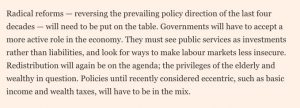Churchill
Beautiful prompt.
March 17, 2022How should we celebrate your day?
If today was a holiday in your honor, what would it be about?
If we had to examine everything about you, your work, your impact, your reputation–what would be the positive caricature we would draw? What sorts of slogans, banners and greetings would we use to celebrate you and your work?
It’s never accurate to boil down an organization or a person’s work to a simple sentence or two, but we do it anyway.
What’s yours?
-Seth Godin
We can create this honor in any moment, and shift our lives to live that honor. What will your day be about? -dayle
“Make your life a little less difficult to another.”
A. Stoddard:
“Don’t quite before the finish line. Walking away from something that is bad for you is not quitting.”
Horace, ‘Never despair.’ Winston Churchill, ‘Never, never.’
Thomas Merton:
“The history of the world, with the material destruction of cities and nations and people, expressed the interior division that tyrannizes the souls of all men, and even of the saints.” -New Seeds of Contemplation
From Merton’s The Sigh of Jonas
“Sooner or later the world must burn, and all things in it…for by that time the last man in the universe will have discovered the bomb capable of destroying the universe, and will have been unable to resist the temptation to throw the thing and get it over with.
And here I sit writing a diary.
But l o v e laughs at the end of the world, because love is the door to eternity; and, before anything can happen, love will have drawn him over the sill and closed the door, and he won’t bother about the world burning because ehe will know nothing about love.”

“Today will be different. Today I will be present. Today, anyone I speak to, I will look them in the eye and listen deeply. […] Today I will take pride in my appearance. I’ll shower, get dressed i proper clothes, and change into yoga clothes only for yoga, which today I will actually attend. […] Today there will be an ease about me. My face will be relaxed, its resting place a smile. Today I will radiate calm. Kindest and self-control will abound. Today I will buy local. Today I will be my best self, the person I’m capable of being. Today will be different.”
“Mother Earth and culture, the mother of mothers, are both a state, even as reverence toward Pachamama is on the rise.”
[Pachamama is a goddess revered by the indigenous peoples of the Andes.]
“Let us apply Julian’s teachings on motherhood to Mother Earth. As we saw in chapter 4, Hildegard was explicitly in her language about Mother Earth, demanding that ‘the earth must not be destroyed.’ The destruction of the earth is the destruction of the feminine. Matricide is ecocide, and ecocide is matricide. Invasion of indigenous lands and destruction of their cultures, the spreading of viruses that killed millions of indigenous peoples…the outcomes were the same. History is filled with matricides of all kinds Genocides, too” (p. 95).
[…]
“The ancient Hindu sages, we are told, ‘predicts the age in which we are now living.’ For them Kali Yuga represents the collapse of every kind of inner and outer coherence and personal and institutional forms of compassion, concern, and justice” (p. 95).
Matthew Fox, ‘Julian of Norwich: Wisdom in a Time of Pandemic-and Beyond.’
‘Radical Reforms’
April 4, 2020Rutger Bregman:
“Wow, Financial Times editorial today. ‘Radical reforms — reversing the policy direction of the last four decades — will need to be put on the table. (…) Policies until recently considered eccentric, such as basic income and wealth taxes, will have to be in the mix.'”
FINANCIAL TIMES
EDITORIAL BOARD
Virus lays bare the frailty of the social contract
Radical reforms are required to forge a society that will work for all
If there is a silver lining to the Covid-19 pandemic, it is that it has injected a sense of togetherness into polarised societies. But the virus, and the economic lockdowns needed to combat it, also shine a glaring light on existing inequalities — and even create new ones. Beyond defeating the disease, the great test all countries will soon face is whether current feelings of common purpose will shape society after the crisis. As western leaders learnt in the Great Depression, and after the second world war, to demand collective sacrifice you must offer a social contract that benefits everyone.
Today’s crisis is laying bare how far many rich societies fall short of this ideal. Much as the struggle to contain the pandemic has exposed the unpreparedness of health systems, so the brittleness of many countries’ economies has been exposed, as governments scramble to stave off mass bankruptcies and cope with mass unemployment. Despite inspirational calls for national mobilisation, we are not really all in this together.
The economic lockdowns are imposing the greatest cost on those already worst off. Overnight millions of jobs and livelihoods have been lost in hospitality, leisure and related sectors, while better paid knowledge workers often face only the nuisance of working from home. Worse, those in low-wage jobs who can still work are often risking their lives — as carers and healthcare support workers, but also as shelf stackers, delivery drivers and cleaners.
Governments’ extraordinary budget support for the economy, while necessary, will in some ways make matters worse. Countries that have allowed the emergence of an irregular and precarious labour market are finding it particularly hard to channel financial help to workers with such insecure employment. Meanwhile, vast monetary loosening by central banks will help the asset-rich. Behind it all, underfunded public services are creaking under the burden of applying crisis policies.
The way we wage war on the virus benefits some at the expense of others. The victims of Covid-19 are overwhelmingly the old. But the biggest victims of the lockdowns are the young and active, who are asked to suspend their education and forgo precious income. Sacrifices are inevitable, but every society must demonstrate how it will offer restitution to those who bear the heaviest burden of national efforts.
Radical reforms — reversing the prevailing policy direction of the last four decades — will need to be put on the table. Governments will have to accept a more active role in the economy. They must see public services as investments rather than liabilities, and look for ways to make labour markets less insecure. Redistribution will again be on the agenda; the privileges of the elderly and wealthy in question. Policies until recently considered eccentric, such as basic income and wealth taxes, will have to be in the mix.
The taboo-breaking measures governments are taking to sustain businesses and incomes during the lockdown are rightly compared to the sort of wartime economy western countries have not experienced for seven decades. The analogy goes still further.
The leaders who won the war did not wait for victory to plan for what would follow. Franklin D Roosevelt and Winston Churchill issued the Atlantic Charter, setting the course for the United Nations, in 1941. The UK published the Beveridge Report, its commitment to a universal welfare state, in 1942. In 1944, the Bretton Woods conference forged the postwar financial architecture. That same kind of foresight is needed today. Beyond the public health war, true leaders will mobilize to win the peace.



